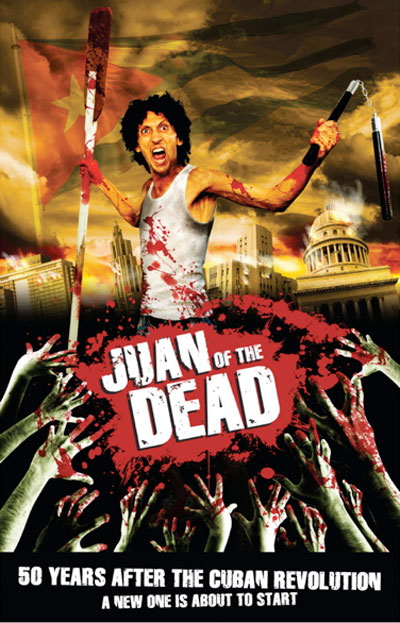Experimental
NO/GLOSS Leeds
The weekend of the 8th & 9th of September saw the launch of Leeds’ first DIY and experimental film festival No/Gloss. As a big fan of film festivals with half-an-eye on experimental film this was pretty exciting. I was only able to attend for one of the two days but I had a great time there.
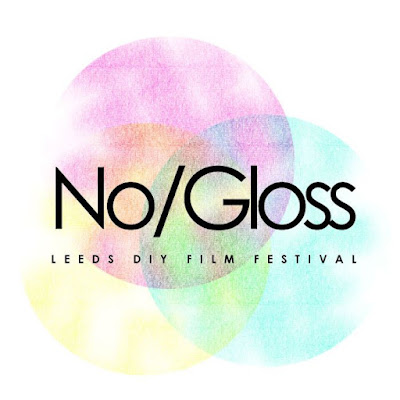
Keeping with the DIY aesthetic, the organisers held it in Wharf Chambers - a co-operatively run Arts-space near(ish) to the Corn Exchange, Leeds. This meant that festival goers could take advantage of the Sam Smiths beer on offer as well as some pretty tasty vegan food. A crowd of film-fans had descended like hungry-wolves on the black-bean paté sandwiches (would hungry wolves eat black bean paté? Not so sure…) but I can vouch for the herb tofu. Great stuff.
The set-up in place at the main screen saw films being shown in three sessions with short breaks between each batch of films. There was a second screen as well, with a long list of shorts that were on a rolling playlist. Sadly, this screen got a bit lost amid the bar, food-counter and conversation of the main room so I didn’t really see very much that was shown on it. But the glimpses I caught did seem interesting.
I’ll write a separate post to review some of the films over the next couple of days, so for now I’ll content myself with saying that the films were varied and interesting. The speed which the schedule see-sawed between funny and depressing did seem a little awkward - finished watching a gritty investigation on homelessness in Manchester? Here’s something funny! - but perhaps that served to emphasise the sheer variety. I’ll put a couple of my favourites at the end.
All in all, NO/GLOSS was a triumph (from the point of view of a punter, at least). And I sincerely hope we’ll see future instalments of this welcome addition to Leeds’ busy cultural calendar.
Some of the best shorts:
Probably my absolute favourite. Bottle by Kirsten Lepore. One of those films that reminds you what fabulous things you can do with a little patience and a whole lot of imagination. A lovely film.
Post Fracas by Xander Robbin is a completely bonkers look at the feelings experienced by a family after being humiliated on a TV-gameshow. A lot of fun
POST FRACAS from Xander Robin on Vimeo.
Surface ii by Sam Spreckley is a beautiful abstract piece. Mesmerising.
Surface ii from sam spreckley on Vimeo.
More from Bradford
Juan of the Dead, the first film I saw at the Bradford Film Festival this year, was by far and away the most ‘Chopping Mall’ themed film of the bunch. The others were a curious bag of experimental and inventive footage that are certainly worth a mention though. I seriously doubt any of them are in line for a DVD release any time soon, so they might be a little harder to track down, but they’re all worth a watch - and as distribution moves more and more towards digital methods, they may well be available at some point.
First up: Vikingland!
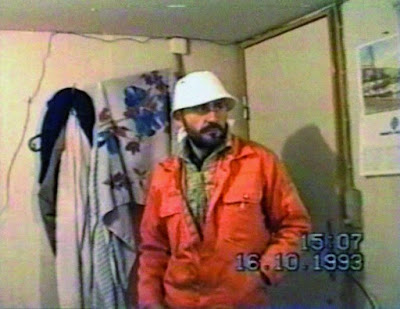
Vikingland’s story is a bizarre one (and possibly even more interesting than the film itself!). The blurb is worth pasting from the official website:
Xurxo Chirro has a passion for record keeping and works in the Archives Department of the local television company. During research, he came upon four video tapes that amounted to 16 hours of rushes and were titled ‘Vikingland’. Luis – an expatriate seaman and a migrant like so many of his fellow Galician countrymen – is the hero of this quite peculiar video saga. This is, indeed, no epic tale but a combination of anecdotes and Luis’ persistence. Between learning how to handle the video camera he has just acquired and the long hours working on the ferry-boat which sails from Denmark to Sylt Island in Germany, where he has been hired as a warehouseman, Luis recorded himself without respite for a whole winter.
So… yes. This is amateur footage shot by a sailor, re-cut by a Galician archive-keeper into something that (supposedly) imitates Moby Dick (Melville is even credited at the end as a writer…). It’s long and it’s slow but also interesting and occasionally amusing. Some of the scenes are almost painfully empty of any action (Luis sets the camera up to watch him moving boxes. We watch him moving boxes. That’s it) but other moments are more compelling.
The extended Galician-sailors’ Christmas dinner is a great scene. The wine-guzzling sailors introduce each dish to the camera and discuss how keen they are to show people what their lives are really like. In this sense it’s a pretty fascinating documentary about the minutae of behind-the-scenes life for the workers in the ship. It is too long, but apart from that it’s got a lot to recommend it. Whether we believe Xurxo Chirro’s story or not, his project is refreshingly real and democratic. There’s no real attempt to make Luis a hero, to explain his history or future, but we’re invited into his little cabin and get to see life as he does.
Next up: Moscow Diary.
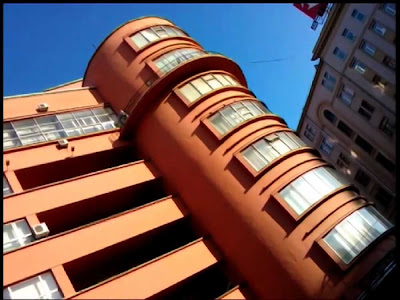
Here, we’re invited to follow Walter Benjamin’s footsteps around Moscow, which he visited for six weeks in the 1920s. It’s shot entirely on a mobile phone and, as we wander the streets, parts of Benjamin’s diary are read out to accompany the film. Although he was partly there to have a look at communism in action, the main purpose for his trip was to pursue actress Asja Lacis with who he was apparently madly in love. Given that I only know Benjamin from his writings on aesthetics and technology and his academic reputation, being shown the fragile and human side to him was quite a surprise. His sad reflections on having waited up all evening in the hope that Asja would swing by are sometimes unsettlingly pathetic: it’s hard to reconcile the philosopher with the lovesick boy.
Visually, the film’s a bit uneven. The mobile-camera works well for the most part - it’s held steady and the image is decent, if not great - but that makes Adam Kossoff’s choice to occasionally use zoomed in shots puzzling because the low-resolution makes it look a right mess. I’m pretty sure by now it’s not a nostalgia-based illusion: low quality digital footage looks a lot worse than low quality film.
Moscow Diary was paired with another mid-length film about Walter Benjamin (you wait ages for a film about Benjamin and then two come along at once…) : Les Anges de Port-Bou (The Angels of Portbou)
In this one, Parisian (?) Benjamin-obsessive Séraphin comes out by train to the border with Spain to recreate Benjamin’s last journey, fleeing France for what he hoped would be safety in Spain, before eventually killing himself in the Spanish town of Portbou.
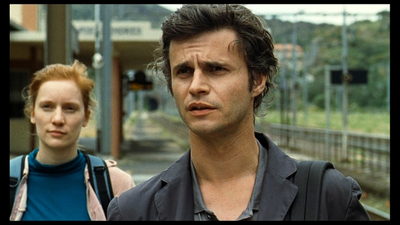
Instead of his friend, who’s supposed to be walking with him, he’s met by his friend’s sister, Gabrielle, who Séraphin reluctantly allows to accompany him across the hills. Their walk ambles between topics, taking in Benjamin’s history, the lives of people in the region and the appeal of mystery amongst other things. It’s a gently told story with plenty left open to interpretation but it’s neatly done, looks beautiful and just flies by. I’d definitely be keen to see more by the director Vladimir Léon.
LIFF25!
Last weekend, the 25th annual Leeds International Film Festival launched its programme, ahead of the festival in November. There’s heaps and heaps of exciting things to look forward to in what is, surely, one of the UK’s premiere film festivals, so I thought I’d do a (very) brief preview here.
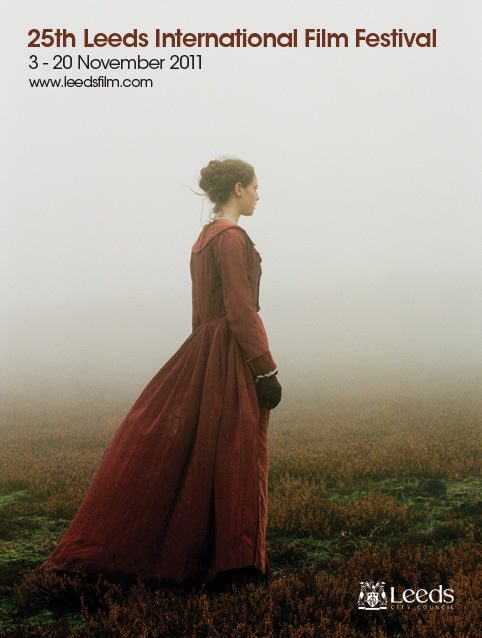
The Official Selection is the home of the big names, high-art and gruelling drama but really does host all sorts of things. It’s nice to see the festival score the coup of a whole bunch of UK premier showings of European and World cinema as well as a handful of very exciting retrospectives. Psycho on the big screen is surely one not to be missed and, though I’ve seen them before, Waltz With Bashir and Persepolis are both great and worth a cinema trip. For the more hardy, Bela Tarr’s epic Sátántangó - which is seven and a half hours long! - is screening in the Hyde Park Picture House. Thankfully it comes with two interval breaks!
In the gleefully brutal and bloody Fanomenon strand, meanwhile, there are also a few exciting treats to look forward to. Heading up the classic genre film retrospectives are Alien, Aliens and Invasion of the Body Snatchers but even these treats don’t seem so tasty when compared to the bounties on offer in the new films selection. Monster Brawl, which pitches all the horror favourites against each other, looks too-good-to-miss whilst _Exit Humanity’_s American Civil War zombie apocalypse would surely be the most gloriously insane zombie adventure imaginable, were it not for it being partnered up with Yoshihiro Nishimura’s Hell Driver and Cuba’s very first zombie film, Juan of the Dead. Oh my! That’s three slices of very different but very exciting ZOMBIE ACTION! Hurrah!
Thirdly, and no less excitingly, comes the fabulous news that all Cherry Kino film screenings are FREE (!) this year! Cherry Kino is the semi-independent experimental film strand of the festival and hosts screenings and workshops of ‘wondermental’ films all year round. CK has it’s own web presence in a blog (HERE!) and should bring some reliably curious, strangely beautiful experimentation to the screen. And it’s FREEEEEE!
This is, obviously, a brief and over-excited preview. I didn’t even find space to squeeze in a mention of the exquisitely bonkers-looking Japanese sub-section of the Fanomenon strand (hint: it’ll be weird!), the Cinema Versa documentary strand or the short films strand. And the Official Selection definitely demands some more attention too. More to come soon!
